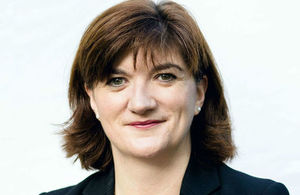Faith groups back move to protect religious education freedom
Religious groups back guidance protecting freedom of schools over religious education.

Nicky Morgan
Religious groups have today (28 December 2015) backed the government’s decision to issue robust guidance that protects the freedom of schools to set their religious studies curriculum in line with statutory guidance and in accordance with the wishes of parents.
The recent Judicial Review of the religious studies GCSE ruled on a narrow, technical point, the meaning of which the Department for Education has now clarified, meaning there is therefore no need to seek permission to appeal from the Court of Appeal.
Instead, the government has issued guidance to schools that sets out clearly that schools will not have to change their religious education curriculum and that there is no need to give non-religious world views equal parity with religious world views in education.
Some campaign groups have subsequently tried to claim that this means that non-religious beliefs such as humanism must be taught on a par with study of religion. However the guidance issued by Education Secretary Nicky Morgan today makes clear that schools can continue to prioritise the teaching of major faiths over non-religious world views such as humanism.
In addition, the guidance reiterates requirements that non-faith schools must reflect the fact that the religious traditions in Great Britain are, in the main, Christian while taking account of the teaching and practices of the other principal religions represented in Great Britain.
The government will also press ahead with the religious studies GCSE. The judge explicitly said that there was nothing unlawful in the content of the RS GCSE itself. The judge made clear that there was “no challenge” to the content of the GCSE.
Education Secretary Nicky Morgan said:
This government is determined to protect schools’ freedom to set their own religious studies curriculum, in line with the wishes of parents and the local community.
The guidance I have issued today makes absolutely clear that the recent judicial review will have no impact on what is currently being taught in religious education.
I am clear that both faith and non-faith schools are completely entitled to prioritise the teaching of religion and faith over non-religious world views if they wish.
Reverend Nigel Genders, Chief Education Officer for the Church of England, said:
There has been confusion about the implications of the High Court judgment [with respect to the GCSE religious studies subject content] and we welcome the publication of this guidance note which clarifies the situation and provides assurance that the judgement does not impact on the content of the new RS GCSE.
Sheila Gewolb, Vice President of the Board of Deputies of British Jews, said:
The Board of Deputies of British Jews welcomes the Department for Education’s guidance, which supports the religious studies GCSE as it stands.
The Board believes that the RS GCSE must continue to support education about the traditional world religions. Other beliefs and world views can - and should - be taught through other subject areas.
Paul Barber, Director of the Catholic Education Service, said:
The CES welcomes this additional guidance which clarifies the position of RE in light of the judicial review outcome.
We are pleased to read that the judgement will not impact upon the content of the new GCSE in religious studies, nor the autonomy of the Catholic Church in determining the content of the RE curriculum in Catholic schools.
Notes to editors
-
The judgement related to the introduction to the RS GCSE subject content. It concluded that a particular paragraph suggested that a school could rely entirely on the content of an RS GCSE syllabus to discharge its obligations with respect to teaching the basic curriculum subject of religious education at key stage 4. The judge found that while that might be the case, it might not always be the case - and so it was wrong.
-
GCSE religious studies subject content and guidance note for schools and awarding organisations.
DfE media enquiries
Central newsdesk - for journalists 020 7783 8300